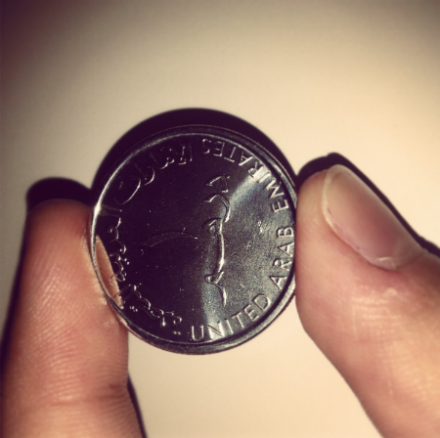Life, at times, chokes one with its wonders, particularly gigantic wonders – tallest tower, highest summit, smartest phone, etc. There is a lot to take in and appreciate that we often lose the pleasure we once derived from a stranger’s smile or the lost dime we noticed by the traffic light as we waited patiently to cross the street. Inattentional blindness – it is not our choice anymore – to turn our eyes away from little things that have once given us pure joy – it is rather that our eyes, even when confronted by the most innocent and noteworthy of gestures and actions, cannot perceive them.
I set out to try to be fully attentive to little things around me: from words, pictures and things that required a 180 degree head turn or two feet bend-down, to situations that involved awkwardly taking photos of seemingly trivial objects in public. It was rather interesting, beautifully significant, and effortlessly thought-provoking all of that which managed to present itself to my consciousness.
1. Honest, beautiful, but repetitive remarks:
- Mom & Dad: “Girls, you get prettier by the day. And we’re not saying that just because you’re our children”. Me: “Mom, Dad – all parents say that to their children, and by that I mean: all parents say “we’re not saying you’re pretty just because you’re our children.”” But thank you. Just another laugh we’re to remember years down the road.
2. Societal consolations:
- When you’re ambitious, people say “dream big, you can do whatever you want in this life.” But when your dreams don’t come true and your hopes come crashing down, people say “well, you know, dreams die.”
- Life is ups and downs, when you’re up, you’re a sinless saint, when you’re down “everybody makes mistakes.” Maybe being straightforward or avoiding such things as white lies is what we hope for, but what we really need is consolation, even when it conveys the silliest and most contradictory of remarks.
3. At the mall:
- Looking at the mall map, trying to find direction to the bookstore, then someone from behind rudely exclaims “excuse me!” and pushes herself forwards to read the map – in my mind, “dude, can’t you freakin’ see that I’m using the damn thing?!” But no. I apologize politely and walk away, having barely satisfied my need of finding the store.
- You make your way out to the parking lot and see a huge box for book-donations, and you think “there’s still some good left in this world”.
4. At the counter:
- You’re 50 cents short of total payment in a supermarket, the cashier asks you to give up one of your groceries. You say goodbye to your favorite chocolate bar and move on in life. Yet, when the cashier owes you some coins and is desperately looking for change in the counter to give it to you, it makes you feel good to whole-heartedly say “it’s ok, keep the change”.
- Naïve – yet when your change contains the brightest, newly-made coin that is mirror-like in clarity, you put it on the shelf and decide to never spend it.
- Impatiently waiting to buy your stuff, and instead of looking at your phone pretending to be busy, you decided to notice the few toys and souvenirs around. It reads “Microwaveable Hottie” and you think to yourself “Daf*q?”. But then you realize that, in reality, “Hot Hugs” are much needed, because the world has gone cold, and stuffed animals whose tummy can be microwaved are more humane than humans themselves.
Maybe waiting at the payment counter gives you the chance to think about the meaning of life.
- You’re out to buy a birthday present for a loved one when an expensive kitchen-tools’ shop catches your eyes. You enter to see the cute little baking utensils, and you look upwards to see the most magnificent and creatively-made chandelier you have ever seen, only to truly wonder “who thought of designing that?”
I don’t know about you, but thinking back to the events and people I encountered, and randomly checking the photos I took on my phone, instagraming them to give them that extra glow to shape a pleasant memory, is pleasurable. Writing this post is also pleasurable – a good exercise and an effort to understand the workings of my mind and the workings of the world. Even my typing in long, fragmented sentences involves the intention of making you think “she’s complicated.”
The headlines in the news, the fancy cars, and skyscrapers never cease to amaze me, but they have equally mastered the art of distracting me from the here and now – from the little things that truly give meaning to life, from the little observations that provoke thinking about the complexity of our world, our society, our failures, our successes, and our short-comings.
Boredom is an illusion – you cannot be bored. There are just so many things around waiting to be noticed and waiting to impact you in some way. Just over seventeen years on Earth, and it is only now that I made such realizations. Some are over 70, and still fail to integrate meaning into life.
It’s simple: look around, and pay attention.









